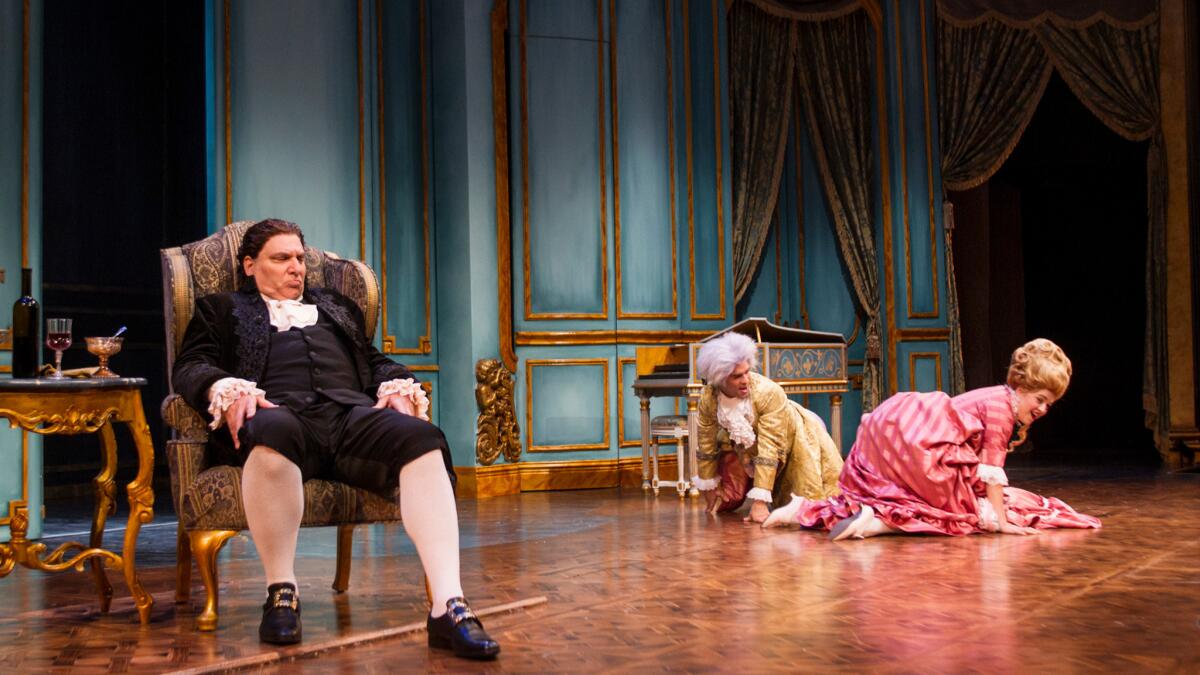Review: But does it deserve an encore? ‘Amadeus’ returns to South Coast Rep

- Share via
Antonio Salieri, relegated by posterity to the shadows as Wolfgang Amadeus Mozart’s journeyman contemporary, will always have Peter Shaffer’s “Amadeus” to augment his notoriety, if not his fame.
Shaffer’s 1979 drama, which gave rise to Milos Forman’s 1984 Oscar-winning film, is a drama about the relationship of these two composers, one a blazing genius underappreciated in his lifetime, the other a workaday talent far more adept at negotiating royal patronage.
In this ironic tale, suggested by a play by Alexander Pushkin, it’s the careerist Salieri, court composer and Viennese music scene eminence, who is the sun around which even Mozart must orbit. Although there’s never any doubt about the identity of the real maestro. When Mozart tests out Salieri’s composition written in his honor, he can’t help but make some on-the-spot improvements that instantly transform the work into something sublimely Mozartian.
“Amadeus” is back at South Coast Repertory, where it was produced in 1983, riding a wave of excitement after its triumphs in London and New York. This revival, directed by Kent Nicholson and starring Marco Barricelli as Salieri, doesn’t have the same excitement — an aroma of ’80s nostalgia is in the Costa Mesa air — but it’s a handsome production and Barricelli’s performance sheds fresh light on the Catholic roots of Salieri’s madness.
Shaffer’s play, which begins with Salieri as an old, half-demented man confessing to the murder of Mozart (Asher Grodman), is built around a single idea — the capricious way artistic gifts are doled out in a world in which envy and mediocrity are never in short supply.
As the drama flashes back to Mozart’s entry into the court of Joseph II (Peter Frechette), the emperor of Austria, we witness firsthand the outraged bewilderment of Salieri. Religiously devoted to music, he is stunned to discover that the young man touched by God with an inordinate capacity for composing is in fact an “obscene child.”
A crisis of faith ensues for Salieri, who doesn’t understand how the mind responsible for such sublime music could be so grossly scatological. What does it say about the Almighty that an artist as low as Mozart could attain such lofty heights in his art? Salieri finds it especially galling that not only have his own prayers for greatness gone unanswered but that he’s the only one equipped to truly appreciate Mozart’s specialness.
Grodman doesn’t mimic the impish cackle that Tom Hulce adopted in his screen portrayal of Mozart. A more subdued characterization, Grodman’s Mozart may seem a touch more realistic to today’s audience, but the performance lacks the eccentric color that’s needed to animate the role.
Barricelli brings an overbearing hamminess to his portrayal of Salieri that can be fatiguing as the character’s garrulous monologues stretch on. But this outsize approach suits the character and the occasion. The play belongs to Salieri — there’s not a chance of Mozart upstaging him in the historical fiction Shaffer has constructed — and Barricelli never lets go of the reins.
Although “Amadeus” was an unqualified hit, Shaffer has recalibrated the drama over the years. The scene near the end in which Mozart, in failing health, struggles to write the “Requiem,” has been revised in a way that focuses attention on Salieri’s agonizing spiritual dilemma. Barricelli infuses Salieri’s last encounter with Mozart with a scalding guilt that is both illuminating and moving.
The supporting cast of Nicholson’s production is solid all around. Two performances stand out: Frechette captures with comic affection the emperor’s doltishness, and Liesel Allen Yeager manages to convey both the ditzy ebullience and sorrowful loyalty of Mozart’s wife, Constanze.
The scenic design by John Iacovelli establishes the background of late 18th century Vienna with attractive simplicity. Alex Jaeger’s costumes add to the festive rococo mood.
The production is an attractive eyeful, but it didn’t convince me that the play is a modern classic. A rambling work that tries to stretch an anecdote into an epic, “Amadeus” too often opts to interpret itself through the gaseous musings of Salieri. This is a sign of the play’s fragile (meager, really) dramatic foundation, which Forman covered up in his film with sumptuous visuals and even more sumptuous excerpts from Mozart’s operas.
Salieri’s existential emergency — his renunciation of a God who could bestow greatness on a goofball — is interesting only because of the historical Mozart. Salieri’s last words to the audience — “Mediocrities everywhere — now and to come — I absolve you all. Amen!” — could be read as the playwright engaging in a form of dramatic criticism.
------------
“Amadeus.” South Coast Repertory, 655 Town Center Drive, Costa Mesa. 7:30 p.m. Tuesdays-Wednesdays, 8 p.m. Thursdays-Fridays, 2:30 and 8 p.m. Saturdays, 2:30 and 7:30 p.m. Sundays. Ends June 5. $30- $82. (714) 708-5555 or www.scr.org. Running time: 2 hours, 45 minutes
More to Read
The biggest entertainment stories
Get our big stories about Hollywood, film, television, music, arts, culture and more right in your inbox as soon as they publish.
You may occasionally receive promotional content from the Los Angeles Times.











